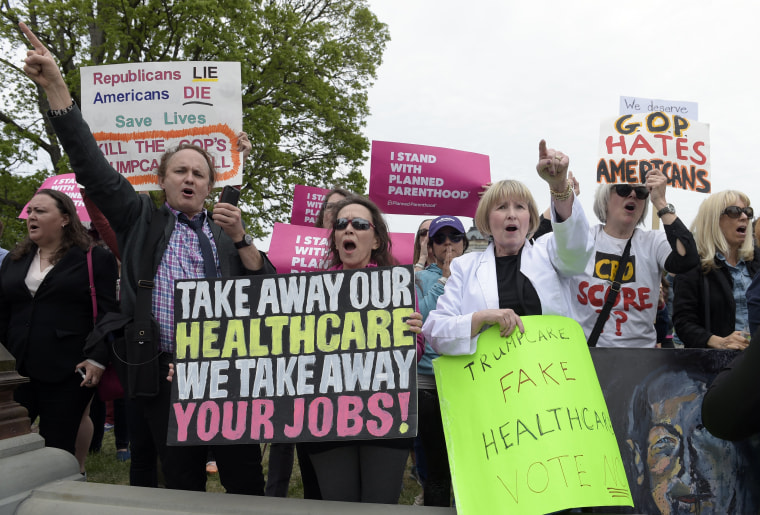Critics of the narrowly passed, Republican-backed health care plan approved by the House on Thursday have issued dire warnings for what the bill's passage could mean for the American health care system. At the top of the list: Less coverage, higher costs and overall confusion about what's in the bill.
Here's a look the most grim assessments of the amended American Health Care Act, or "Trumpcare."
It Slashes Coverage and Cuts Medicaid
At least 24 million Americans could lose health care coverage by 2026 under the new plan, according to a Congressional Budget Office score of the doomed GOP bill introduced in March. The version passed Thursday was not scored.
Fourteen million people will also drop off Medicaid due to major cuts, according to the CBO analysis.
"Every Republican who votes for #Trumpcare will have it tattooed on their forehead," House Minority Leader Nancy Pelosi tweeted.
Former Democratic nominee Hillary Clinton called the bill a "shameful failure of policy & morality by GOP today" in a tweet urging followers to fight back.
Americans With Pre-existing Conditions Could Face Higher Costs
The new bill allows states to seek a waiver that would allow them to skirt an Obamacare requirement that mandates insurers charge those with pre-existing conditions the same as healthy people for coverage. That could lead to high-risk pools to provide coverage to those who otherwise won't be able to afford it.
Rep. Fred Upton, R-Mich., spearheaded another amendment that gives $8 billion over five years to help fund insurance in the states that opt out. But critics say the $8 billion falls far short of what would be needed to offset costs.
The Upton Amendment was an attempt to placate moderate Republicans who would not vote for the bill without support for pre-existing conditions. In the end, though, 20 Republicans voted no, including Colorado Rep. Mike Coffman, who had concerns over how the bill dealt with pre-existing conditions.
Increased Premiums
Premiums may decrease for healthy individuals while skyrocketing for those with pre-existing conditions and senior citizens. The AARP, a senior citizen advocacy group, says a typical 55-year-old earning $25,000 could see payment increases north of $2,300 per year. That number gets even higher for older Americans. The previous CBO score found that a 64-year-old making $26,500 per year would see premiums spike up by $12,900 on average.
And according to the analysis, lower-income families will also see deductibles go up. It's not clear what, if anything, the new version would do to address these concerns.
No one knows exactly what's in it
The final version of the legislation was posted late Wednesday night, giving lawmakers little time to read the hundreds of pages before the vote Thursday afternoon. Republicans argue it is a far cry from the thousands of pages that composed the Affordable Care Act.
Some moderate Republicans, like Rep. Barbara Comstock, said the uncertainties about the legislation ultimately made her decide not to support it.

